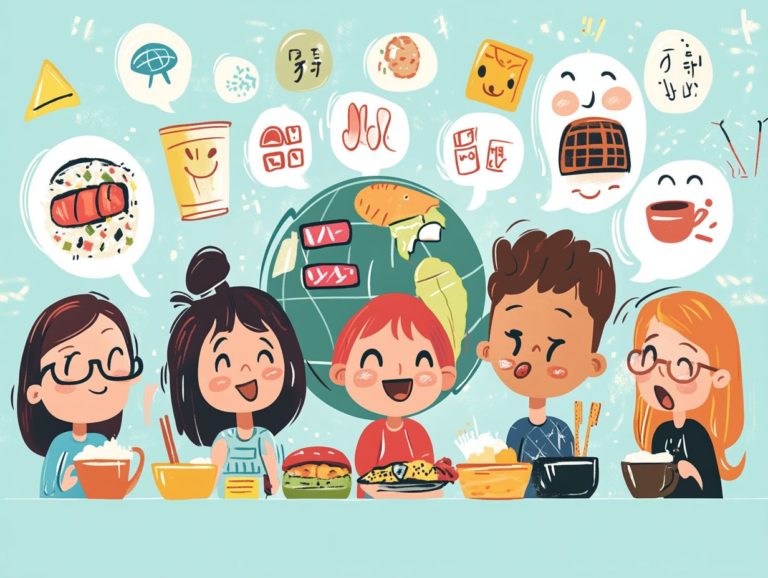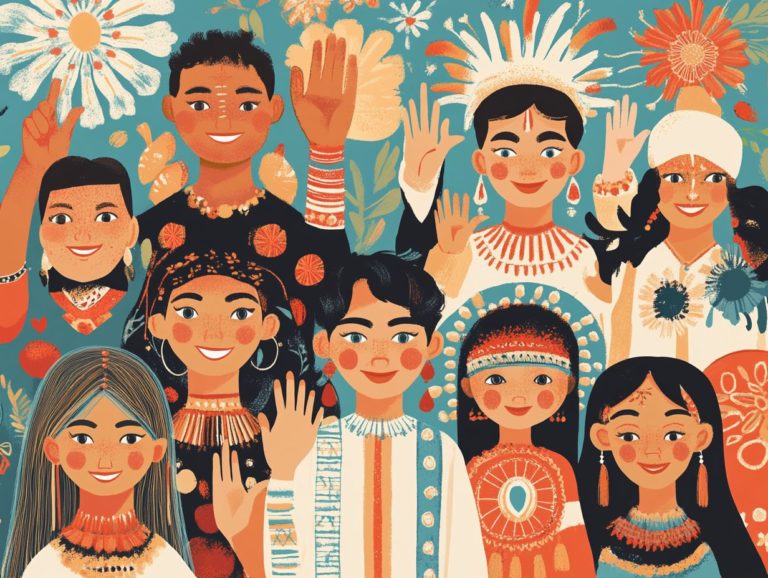10 cultural insights from language learners’ experiences
Language learning transcends mere vocabulary memorization; it’s a vibrant journey brimming with self-discovery and cultural exploration.
As you navigate through various languages, you’ll find doors swinging open to new perspectives, traditions, and connections. This article highlights ten enriching insights from language learners, revealing how mastering a new language can deepen your cultural identity, foster meaningful relationships, and enhance your professional opportunities.
Get ready to discover how language can transform your life! Dive in and uncover the unique experiences that await you!
Contents
- Key Takeaways:
- 1. Language Learning Is a Journey of Self-Discovery
- 2. It Opens Doors to New Cultures and Perspectives
- 3. Language Is More Than Just Words; It’s an Expression of Culture
- 4. Learning a Language Requires Patience and Perseverance
- 5. The Importance of Immersion in Language Learning
- 6. Language Learning Can Be a Humbling Experience
- 7. It Helps to Break Down Barriers and Stereotypes
- 8. Learning a Language Can Strengthen Cultural Identity
- 9. The Role of Language in Building Relationships
- 10. Learning a Language Can Enhance Professional Opportunities
- How Can Language Learning Benefit One’s Personal Growth?
- What Are the Most Common Challenges Faced by Language Learners?
- What Are the Different Approaches to Language Learning?
- Overcoming Language Barriers in Multicultural Settings
- What Are the Benefits of Learning a Language at a Young Age?
- What Are the Cultural Nuances and Etiquette to Be Aware of When Learning a Language?
- Frequently Asked Questions
- What Are Some Common Cultural Insights Gained From Language Learners’ Experiences?
- How Can Language Learners Benefit From Understanding Different Cultures?
- What Are Some Challenges Language Learners May Face When Learning About a New Culture?
- What Role Does Language Play in Understanding a New Culture?
- What Are Some Ways Language Learners Can Actively Engage in Cultural Exchange?
- How Can Cultural Insights Gained From Language Learners’ Experiences Improve Cross-Cultural Communication?
Key Takeaways:
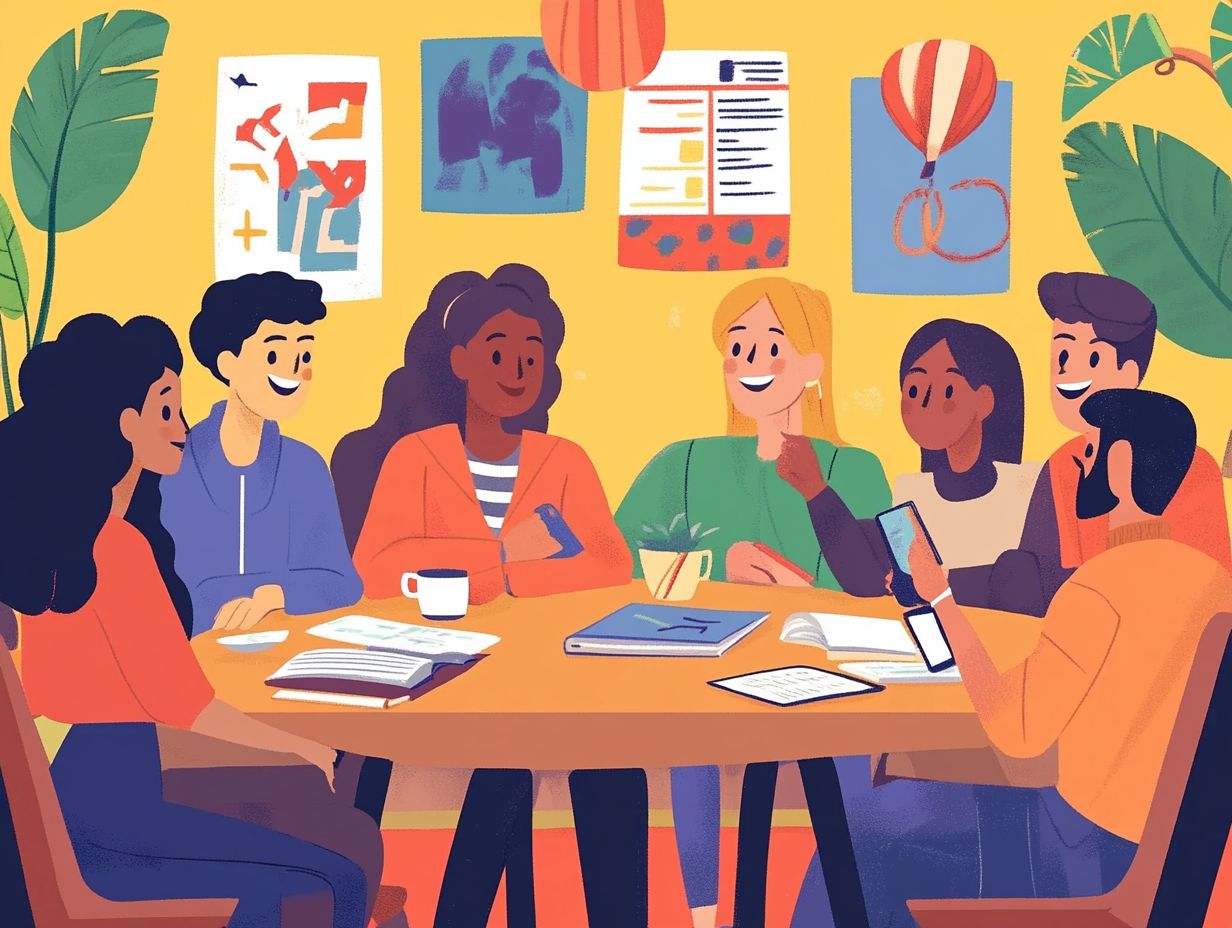
Language learning is a journey of self-discovery, allowing one to better understand their own cultural identity and explore cultural practices to enhance language skills.
Learning a language opens doors to new cultures and perspectives, fostering empathy and understanding.
Language is more than just words; it is an expression of culture that can help break down barriers and stereotypes.
1. Language Learning Is a Journey of Self-Discovery
Language learning is not merely an educational task; it is a deep journey of self-discovery that intertwines with various facets of your life, including your family background, home language, and emotional health. To enhance this experience, understanding the 5 essential cultural competencies for language learners fosters both social and emotional growth in you as a language learner.
Engaging with authentic materials like movies, music, and literature helps you explore cultural topics. This prompts reflection on your own identity.
This immersion provides you with valuable insights into your family history, enriching your understanding of who you are and where you come from.
Mastering the English language does more than enhance your communication skills; it opens pathways for you to interact with diverse cultures, significantly elevating your intercultural competence. As you navigate these unique social dynamics, you cultivate a greater appreciation for the richness of global perspectives, ultimately contributing to your holistic development.
2. It Opens Doors to New Cultures and Perspectives
Learning a language, particularly English, opens up a world of new cultures and perspectives for you. It allows you to engage deeply with the customs and traditions found in English-speaking countries.
This engagement can manifest in various enriching ways, such as diving into the compelling narratives of both classic and contemporary literature. These works illuminate the unique social issues and historical contexts of different societies.
Watching acclaimed films from diverse cultures offers a visual storytelling experience that provides insights into the everyday lives, aspirations, and challenges faced by people across the globe.
Exploring an array of musical genres not only enhances your listening experience but also deepens your appreciation for the emotions and stories that different cultures convey through their art.
Ultimately, these immersive cultural experiences create significant exchanges, bridging gaps between individuals and cultivating a sense of empathy that knows no borders.
3. Language Is More Than Just Words; It’s an Expression of Culture
Language is not merely a collection of words; it is a vibrant expression of culture, capturing the characteristics and values of its speakers while offering a glimpse into their unique experiences and insights.
Recognizing that grammar and vocabulary come laden with cultural nuances is crucial for anyone aspiring to master a language. Exploring essential cultural topics for language learners reveals the subtleties of tone, context, and colloquial expressions, which unveil much about societal norms and interpersonal relationships within that culture.
Engaging with authentic materials such as literature, films, and songs allows you to immerse yourself in the language as it is genuinely spoken and written, rather than through artificial constructs.
This approach cultivates a deeper connection to both the language and its cultural roots, giving you the power to communicate effectively and truly appreciate the richness of its heritage.
4. Learning a Language Requires Patience and Perseverance
Embarking on the journey of learning a language requires immense patience and perseverance. You will navigate the details of language development and face challenges in achieving English proficiency.
Academic support is crucial for motivation. It provides a safety net of encouragement and resources.
Take, for example, Maria, a bilingual student who initially struggled with language barriers in her new school. With the mentorship of caring teachers and the camaraderie of engaging study groups, she immersed herself in English through social interactions and collaborative projects. Gradually, she built her confidence.
Similarly, Ahmed faced cultural adjustments. He found solace in after-school programs that nurtured his language skills and offered a community where he felt understood. These stories illustrate how persistent effort, paired with supportive environments, can lead to remarkable success in language acquisition.
5. The Importance of Immersion in Language Learning
Immersing yourself in a language-rich environment is essential for mastering a language. This allows you to engage with cultural activities, guest speakers, and various forms of visual input that enhance your comprehension.
Join local events to experience the language in action! By participating in cultural festivals or workshops, you’ll hear native speakers use lively expressions that truly bring the language to life.
Utilizing tools like Picture Exchange Communication System (PECS) charts can help simplify complex grammatical structures, making it easier for you to grasp everyday conversations.
These immersive opportunities not only build your confidence but also provide invaluable insights into the nuances of the language and its cultural backdrop. This fosters a deeper appreciation and enables more effective practical application.
6. Language Learning Can Be a Humbling Experience
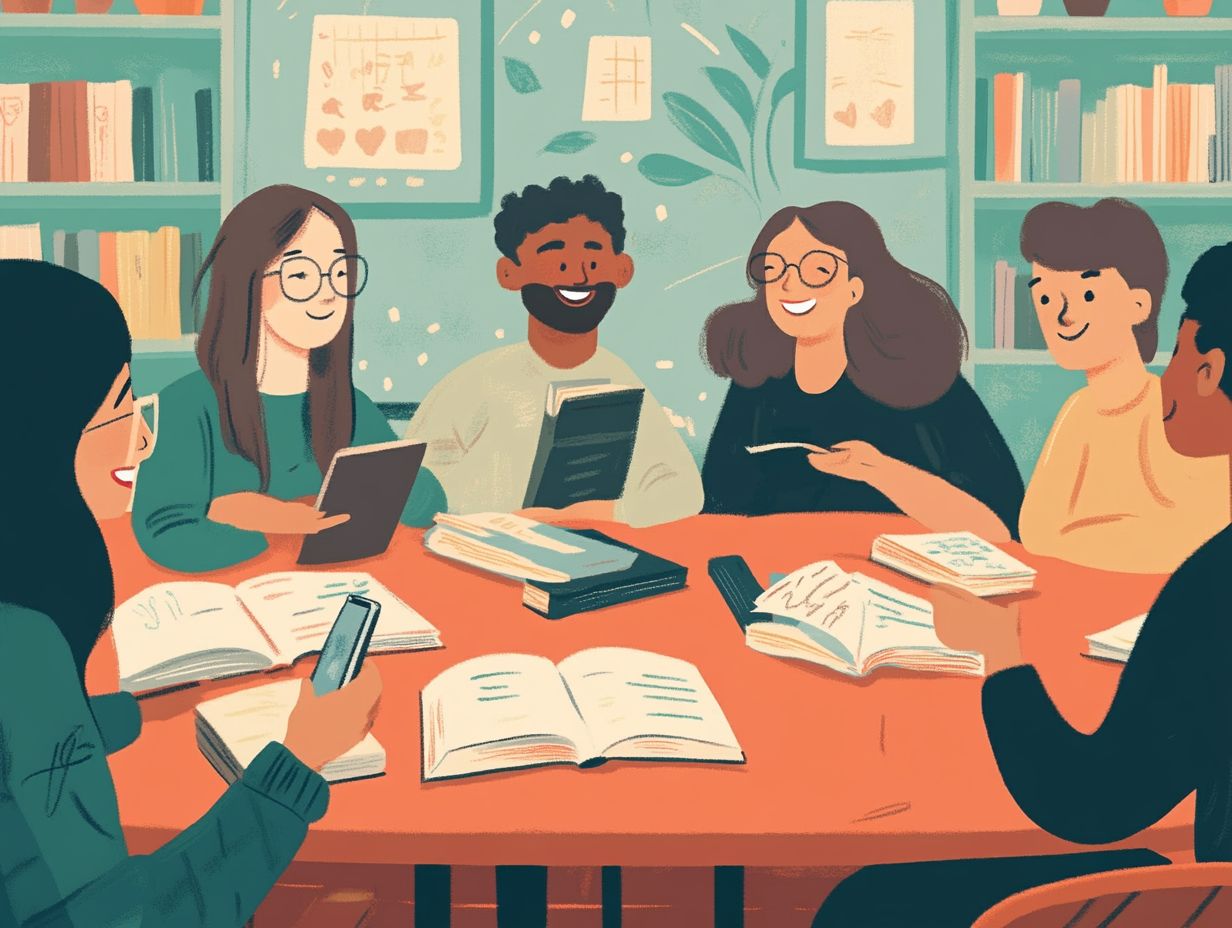
The journey of language learning can be humbling. You’ll face communication challenges due to cultural differences and unfamiliar classroom dynamics, often stemming from the top 10 cultural misunderstandings in language learning.
These challenges can surface in various forms, including misinterpreted idioms, different nonverbal cues, or the subtle social nuances that shape conversations. A phrase that conveys friendliness in one culture might seem intrusive in another, leading to confusion and discomfort.
Navigating these complexities tests your language skills and prompts you to reflect on your communication styles and cultural assumptions. Learning about language can deeply enhance this process, as outlined in 5 ways language learning can foster cultural understanding. Such misunderstandings teach us essential lessons in empathy and adaptability, key components for emotional well-being.
By embracing these moments as opportunities for growth, you transform frustration into a richer understanding of yourself and others. This ultimately enhances your language acquisition journey.
7. It Helps to Break Down Barriers and Stereotypes
Learning a new language is essential for breaking down barriers and challenging stereotypes. It fosters a deeper understanding and appreciation of cultural diversity.
As you engage with various linguistic contexts, you cultivate the ability to empathize with others’ experiences and perspectives. Through interactive lessons that incorporate role-playing, storytelling, and group discussions, you refine your language skills while sharing personal narratives that showcase your unique background.
These shared experiences foster a sense of community in the classroom, helping to dismantle preconceived notions about different cultures. To enhance this positive atmosphere, instructors can celebrate various cultural traditions and invite guest speakers from diverse backgrounds. This enriches your learning experience and promotes a profound connection among all participants.
8. Learning a Language Can Strengthen Cultural Identity
Learning a new language can greatly improve your cultural identity. It allows you to connect with your family values and traditions while embracing diverse cultures.
You can explore a tapestry of perspectives and stories that bridge the gap between heritages.
If you speak Spanish at home, you might appreciate your roots more as you learn about cultural celebrations like D a de los Muertos or Quincea eras. Similarly, immersing yourself in French can reveal fresh ways to celebrate your multicultural background.
This process helps you understand what it means to belong to multiple worlds. Language is not just a communication tool; it links your personal stories with the collective memories that shape identity.
9. The Role of Language in Building Relationships
Language is an essential tool for building relationships. It enables effective communication and fosters deeper connections with people from various backgrounds.
It acts as a bridge, helping you navigate the intricacies of different cultures and turning potential misunderstandings into opportunities for cooperation and empathy.
For instance, a study by the British Council shows that people who speak multiple languages better recognize and respect cultural nuances, enriching their interactions.
Many travelers share anecdotes of how learning a few phrases in the local dialect warms hearts and breaks down social barriers. Such gestures not only show respect but also pave the way for shared experiences, nurturing friendships that transcend geographic boundaries.
10. Learning a Language Can Enhance Professional Opportunities
Proficiency in a new language, especially English, can significantly elevate your professional opportunities. It provides essential skills for effective global communication and cultural insights.
This is particularly crucial in sectors like healthcare, where clear communication is vital for delivering quality patient care, and in international business, where negotiations depend on understanding different cultures.
Companies in technology and financial services actively seek candidates with language skills, as multilingual employees facilitate smoother transactions across borders.
Being bilingual also opens doors in tourism and hospitality, enriching customer experiences by bridging language gaps.
In today’s interconnected world, your ability to converse in multiple languages not only expands your career prospects but also enhances your adaptability. Don’t miss out on the chance to open doors in your career!
How Can Language Learning Benefit One’s Personal Growth?
Language learning is a transformative journey that can significantly elevate your personal growth. It enhances your emotional well-being and fosters cross-cultural understanding through immersive experiences.
As you engage with new languages, you’ll likely develop a deeper sense of empathy and gain insights into diverse perspectives and lifestyles.
For example, by learning Spanish, you might uncover the rich cultural heritage that accompanies the language, leading to a more compassionate understanding of the challenges faced by Spanish-speaking communities.
Navigating complex texts in another language sharpens your literacy skills, allowing you to analyze and articulate your thoughts more clearly. Your communication abilities will also improve, opening doors in both personal and professional realms.
Consider the recent testimonial from a university student who discovered that learning Mandarin boosted his academic performance and helped him connect with international peers, enriching his overall college experience.
What Are the Most Common Challenges Faced by Language Learners?
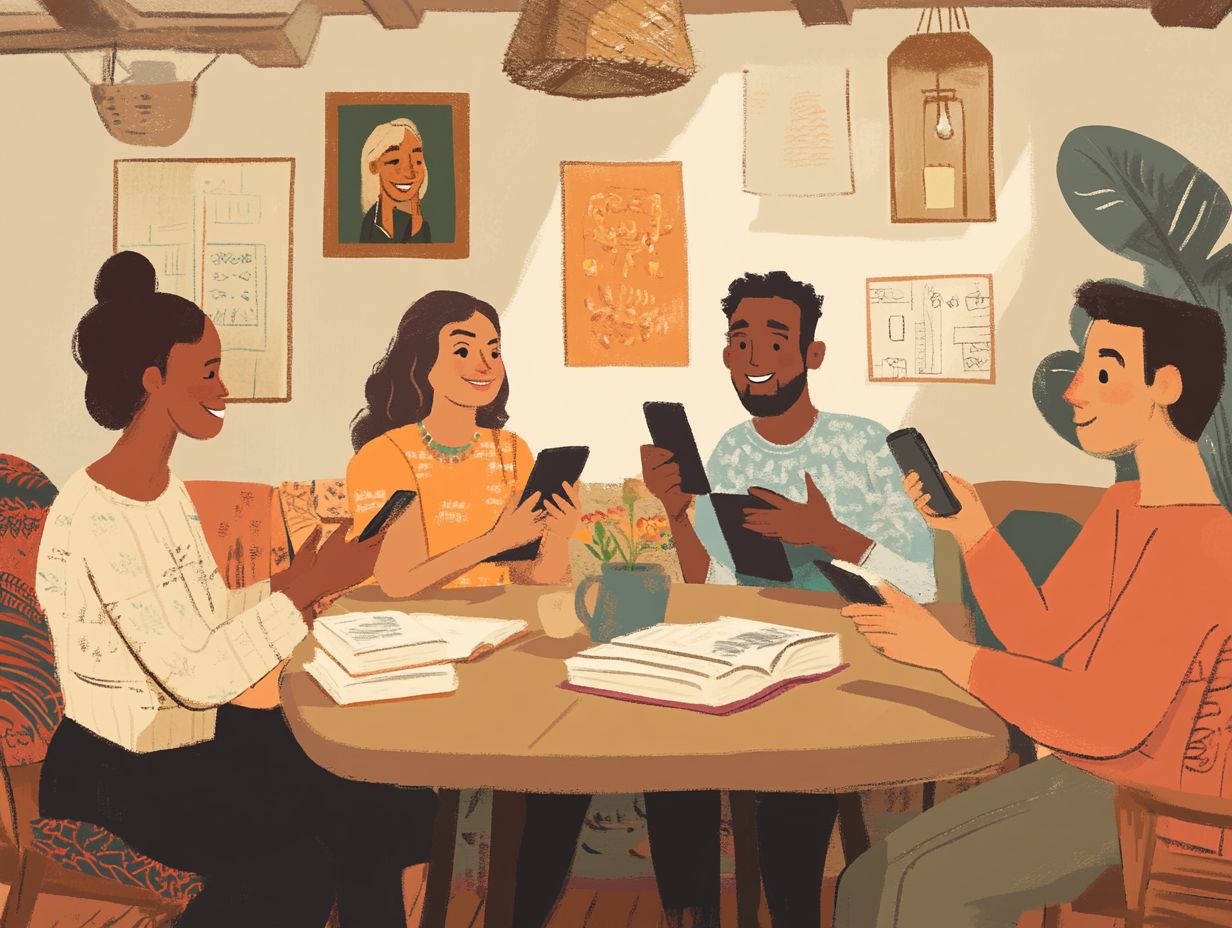
Language learners often face a range of common challenges, such as communication barriers and complex cultural nuances. To navigate these difficulties, exploring language learning tips inspired by cultural practices can be beneficial. Emotional health issues can also arise during the learning journey.
You might find yourself grappling with language anxiety. The fear of making mistakes can stifle your ability to engage fully in conversations.
Limited vocabulary can impede your capacity to express thoughts and feelings effectively. Cultural misunderstandings may lead to discomfort or miscommunication, complicating interactions even further.
To navigate these hurdles, immersing yourself in environments that foster conversation without judgment is incredibly beneficial.
Building a supportive community with encouragement from peers and instructors can significantly elevate your overall learning experience.
What Are the Different Approaches to Language Learning?
You have many approaches available for language learning, each with unique benefits think of learning through real-life tasks, using authentic materials, and engaging in vibrant cultural activities.
One standout method is learning through real-life tasks. This approach invites you to tackle meaningful activities that mimic real-world situations, helping you build practical communication skills.
Another approach is interactive language teaching. This method focuses on interaction as the core of your language journey, allowing you to express yourself in context-rich scenarios.
These approaches go deeper into the language, sparking your curiosity! They seamlessly integrate cultural insights that deepen your understanding.
By including cultural elements in lessons, educators can create a dynamic learning environment where you feel more engaged and motivated to explore the rich nuances of the language.
Overcoming Language Barriers in Multicultural Settings
Overcoming language barriers in a multicultural setting requires strategic approaches to communication challenges. This fosters an environment rich in cultural diversity and mutual respect.
One effective method is utilizing visual aids, such as pictures or diagrams, to convey messages clearly. This helps avoid misunderstandings.
Incorporating closed captioning during presentations or videos is another excellent tactic. It ensures everyone can grasp the information being shared, regardless of their language proficiency.
Cultivating an atmosphere of patience and empathy is crucial. Recognizing the efforts of others to communicate lays a solid foundation for better collaboration among diverse participants.
What Are the Benefits of Learning a Language at a Young Age?
Learning a language while you re young enhances your language development and boosts your cognitive abilities. It also supports emotional well-being and future prospects as a bilingual individual.
Don t miss this critical window! Your brain is primed for learning from birth to around age seven, making it a perfect time for language acquisition.
Research shows that children exposed to multiple languages early tend to achieve greater fluency and cultural awareness compared to those who start learning later.
For instance, studies indicate that children who master a second language before turning ten excel in tasks requiring problem-solving and creativity, often outperforming their peers.
These early experiences enhance cognitive growth and cultivate empathy. They foster a deeper understanding of diverse cultures, reinforcing that the advantages of early language learning extend well beyond simple communication.
Start exploring new languages with your child today!
What Are the Cultural Nuances and Etiquette to Be Aware of When Learning a Language?
Understanding cultural nuances and etiquette is crucial for you as a language learner. It helps you navigate communication challenges and fosters smoother interactions across diverse cultures, highlighting the ways culture enriches language learning experiences.
For instance, when you’re in Australia, using casual language and humor can create a warm, friendly atmosphere. Be ready to show politeness and professionalism in the UK, especially in work settings.
In the United States, the custom of directness emphasizes clarity and assertiveness, which can differ from the more indirect styles preferred in other countries.
By familiarizing yourself with these variations, you enrich your learning experience and cultivate mutual respect. This understanding allows you to connect on a deeper level and avoid potential misunderstandings.
Frequently Asked Questions
What Are Some Common Cultural Insights Gained From Language Learners’ Experiences?

Common insights include learning about traditions, understanding the importance of body language, and discovering cultural insights from language learning apps that provide a new perspective on cultural diversity.
How Can Language Learners Benefit From Understanding Different Cultures?
Language learners develop empathy, expand their worldview, and create meaningful connections with people from different backgrounds by understanding cultures.
What Are Some Challenges Language Learners May Face When Learning About a New Culture?
Challenges may include language barriers, culture shock, and navigating unfamiliar social norms and behaviors.
What Role Does Language Play in Understanding a New Culture?
Language is crucial in understanding a culture, reflecting the values, beliefs, and social norms of a society. It provides insights into the cultural background of native speakers.
What Are Some Ways Language Learners Can Actively Engage in Cultural Exchange?
Language learners can immerse themselves in the community, participate in cultural events, and seek opportunities to interact with native speakers.
How Can Cultural Insights Gained From Language Learners’ Experiences Improve Cross-Cultural Communication?
Cultural insights can enhance communication by promoting understanding and respect, reducing misunderstandings, and allowing for more effective interactions.


